I’m gonna be honest, I find a lot of elves to be tremendously dull. They’re haughty, immortal, unknowable beings that keep to themselves and they live like forever. Writing an interesting elf can be an uphill battle and it’s hard to find an angle that isn’t thoroughly covered. That’s why I have been so blown away by Frieren: Beyond Journey's End, an anime that upends the concept of elves so thoroughly, and in the process everything in the fantasy genre, that it is quickly becoming the best anime I have seen all year.
As of this writing, Frieren is 12 episodes into its current run. The show is adapted by Madhouse from the manga of the same name by Kanehito Yamada with illustrations by Tsukasa Abe. The manga has had a successful run since 2020, with the show quickly gaining steam. I initially became interested in the adaptation when I found out Yoshiaki Kawajiri, director of Ninja Scroll and Vampire Hunter D: Bloodlust, was going to storyboard it. Everyone has “their guys'', and Kawajiri is one of mine. He’s had a strange career trajectory since the 2000s, settling into doing storyboard work. I make a habit of trying to watch everything he works on, one because he’s one of the best to ever do it, and two because everything he has done has been at least interesting if not very good.
Spoilers follow for Frieren: Beyond Journey's End.

Frieren centers around the titular elven mage in a textbook group of adventurers – a charming hero named Himmel, a drunk priest named Heiter, and a taciturn dwarf named Eisen. The Hero’s Party have, over the course of a decade, traveled together and defeated the infamous Demon King, ushering in an age of peace. Instead of focusing on the by-the-numbers journey directly, the show begins at the end; with the party returning triumphantly from saving the world, their place in history seemingly secure. Statues are erected, a grand festival is thrown, and Himmel the Hero reflects on their 10 year journey and their friendship. But the 1000 year old Frieren is seemingly unfazed. “It was merely a ten-year adventure,” she says. Moments later, a meteor shower that only appears once every 50 years takes place. Himmel remarks on its beauty, while Frieren glumly adds that it’s a bad view from the city, and promises that she’ll show them a better view in 50 years. The next day she departs on a journey to collect spells, and says she will visit.
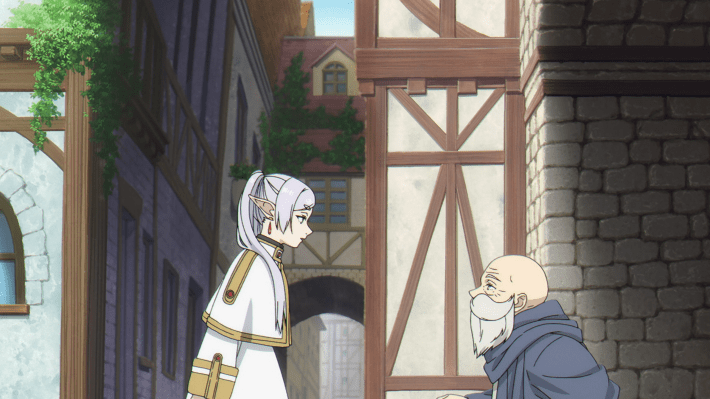
Seemingly in the blink of an eye, 50 years pass. Frieren journeys by herself, an aloof and ageless traveler, until she needs the horn of a Shadow Dragon she left with Himmel and is reminded of her promise to see the Era Meteor Shower with the party again. Returning to the city, she now finds Himmel the Hero has become a bald, wizened old man.The group, now older, reunite, and journey like they used to until they get to the hilltop and see the meteor shower promised. Soon after, Himmel passes, and at the hero’s funeral, something breaks in the ageless Frieren.
“We traveled together for a mere ten years. I knew human lives were short but why didn’t I try to get to know him better?” Frieren sobs.

What separates Frieren from other fantasy works is the matter of perspective. To be an elf is not just to live a seemingly ageless aloof life, but to be reminded of the reality that the humans around you will age and die. As the story progresses, we often see things from Frieren’s pace – time blinks by, old legends fade into the dust, statues lose their meaning, history becomes legend. But to an elf it’s like a week or a month has passed. It is a bittersweet work about death, life, love, and the time dilation that comes from living for an eternity.
For the rest of the series, time is measured not in definite years but from the number of years that have passed since Himmel the Hero’s Death. 20 years pass, Frieren returns to the elderly Heiter who has adopted a magically inclined orphan named Fern. Heiter tricks Frieren into raising the aloof but talented child, before himself passing into old age and history. Frieren, for the first time, must be a mentor to a young apprentice.
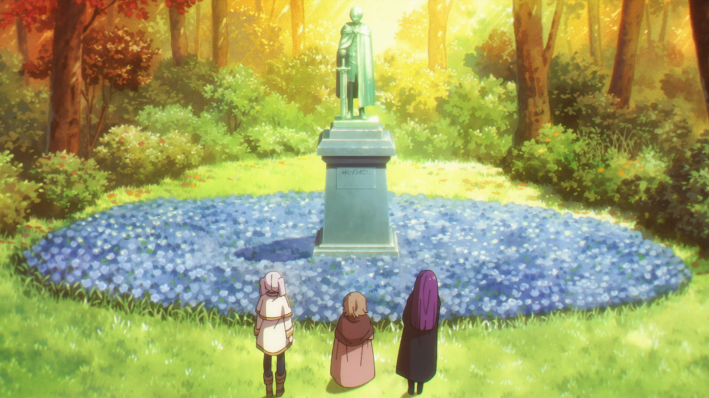
As tremendously sad as that sounds, Frieren is a heartwarming, funny show and not without action. But what makes it a holistically satisfying show is that it takes its time to get there. Fern and Frieren continue to journey together. Frieren’s main hobby is wandering around collecting spells, many which are seemingly inane and useless, like a spell for making warm tea, or one that turns sweet grapes sour. The journey slowly becomes a way for Frieren to reflect and recreate the 10 year journey she spent with the party as well as her life thus far. At one point Frieren spends six months trying to find a spell to make Himmel the Hero's favorite flowers bloom, a seemingly frivolous task. “I used to live much more apathetically.” Frieren remarks “But then I got to know an idiot who complimented the spells I gathered.” As time goes on and Frieren begins to live with Fern, the pace of the show slows down, as if to suggest that Frieren is becoming considerate of what it means to see time from the perspective of a human.
If you play RPGs, the most interesting part is rarely the big huge confrontation, but the moment to moment connective tissue that bonds you to other party members. My favorite RPGs are the ones that feel like they are made whole cloth from side quests, and Frieren does the most interesting thing you can do which is to foreground that idea. But what keeps the show going is that every point it is interrogating the most tired tropes and assumptions of the genre it is working with.
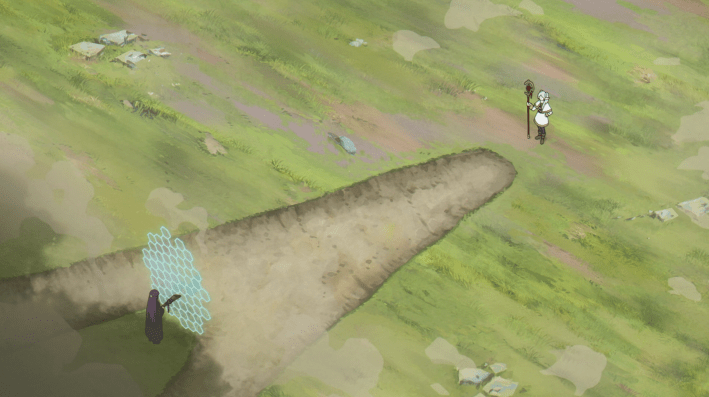
A good example is the conception of magic in the show. Magic is not a static force like it is in much of fantasy, but a science that develops over time like technology or warfare. What once was the deadly killing spell of an evil wizard eventually becomes a part of everyday magic, in the way that a flintlock pistol would seem quaint by today’s standards. Time and magic change rapidly, particularly from the point of view of humans. Additionally, unlike much of fantasy, the conception of the soul and the afterlife is not certain. A much lazier work might start with the assumption that if magic is real, then ghosts and the soul certainly are, but Frieren bucks against this assumption. In a flashback to the party’s journey, it is revealed that dwarves do not believe in an Afterlife, because they respect tradition and this was generally the most commonly held belief until several thousand years ago. Frieren herself states that Magic has not progressed to the point where it can measure a soul, so it can neither prove nor disprove the afterlife at this point. Despite living in a fantastical world, the people of Frieren are as uneasy and unsure about the darkness of their own death as we are.
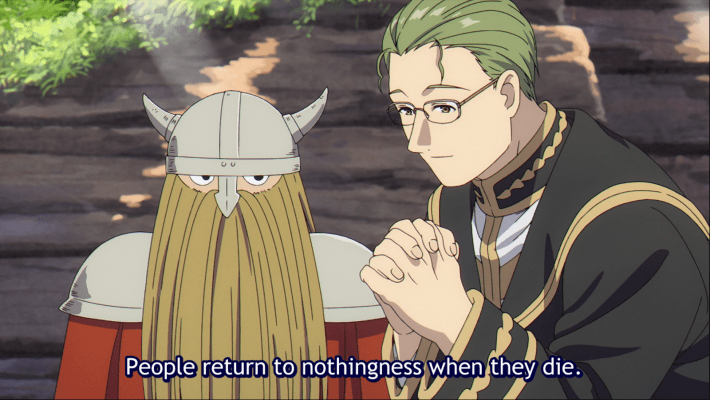
The concept of good and evil is also aggressively interrogated. Demons play a big part in the show later on, and how the work conceptualizes them is itself atypical. Instead of interrogating which creatures are worthy of personhood, which Baldur’s Gate 3 does wonderfully, Frieren runs in the opposite direction. In this universe, Demons are merely human shaped monsters; apex predators that have evolved into the shape of humans through a form of aggressive mimicry. They have evolved to speak and reason, and more importantly to beg and plead. Like Brood Parasitism, a child demon knows what noises to make to survive, but demons are solitary creatures that raise themselves and they inevitably return to their instincts. Seen in this light it is debatable that a demon isn't truly evil, because it does not possess human morality despite being able to mimic it. A demon is simply a creature acting on its own nature, namely manipulating the sympathies of humans.
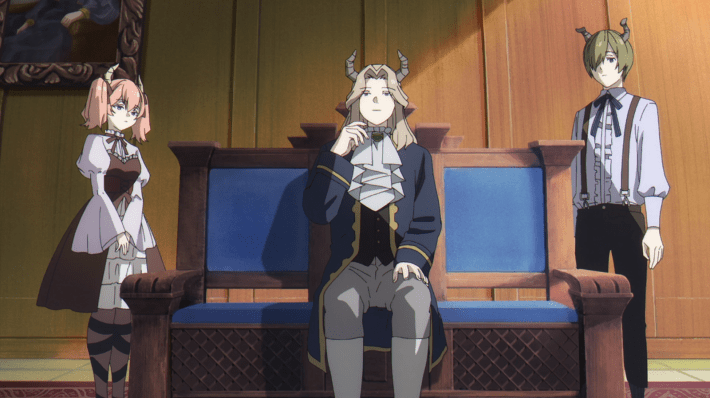
The most compelling part of the show remains Frieren herself. Despite being a narrative about an elf, it is also a humanizing one. At the start of the series, Frieren is functionally a semi-immortal young adult, distracted by frivolous journeys, barely able to wake up before noon, whose heart is pragmatically hardened to the mortality of herself and others. When you are young, you are selfishly filled with the oceanic feeling that the time in front of you is eternal. To grow older is to realize that time is finite, that you must treasure those around you and be accountable to the people in your life. A good friend described this Frieren as “adult”, and I think that is apt, particularly in a market saturated by infantilizing Isekai shows that are, by definition, about fleeing from that realization.
To be loved is to be changed, as the internet meme goes. “My adventure with you wasn’t even one one-hundredth of my life.” Frieren recalls saying to Eisen the dwarf at the first Meteor shower. 78 years later, she reflects on this. “I might’ve said something like that.”
Eisen, now much older, laughs. “It’s funny isn’t it. That one one-hundredth changed you?”
Frieren: Beyond Journey’s End is streaming now on Crunchyroll.


